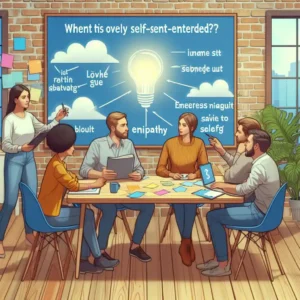As you stand at the threshold of divorcing a narcissist, you’re likely feeling overwhelmed, anxious, and unsure of where to start. You’re not alone.
Divorcing a narcissist requires a different approach than a typical divorce, and having a clear grasp is crucial to understand the tactics they’ll use to manipulate and control you throughout the process.
You’ll need to anticipate their moves, gather evidence strategically, and build a strong support network to counter their emotional attacks. But first, you need to understand the narcissistic mindset and how it will impact every step of your divorce journey – and that’s exactly where we’re about to begin.
In a Nutshell

- Recognize narcissistic traits and patterns to develop strategies to protect yourself from emotional abuse and manipulation during the divorce process.
- Secure competent legal representation experienced in high-conflict divorces involving narcissists to safeguard your rights, assets, and emotional well-being.
- Gather evidence strategically, including financial records, emails, and communication logs, to build a strong case and establish a pattern of behavior.
- Be aware of manipulation tactics, such as gaslighting, emotional blackmailing, and playing the victim, and develop a support network to stay grounded and focused.
Understanding Narcissistic Behavior
You likely didn’t marry a narcissist intentionally, yet you’re now facing the formidable task of divorcing one, which makes understanding narcissistic behavior pivotal to traversing the complexities ahead.
Recognizing the patterns of narcissistic traits in your partner can help you navigate the divorce process more effectively.
Narcissistic individuals often exhibit a grandiose sense of self-importance, a need for admiration, and a lack of empathy.
They may use emotional manipulation, gaslighting, and emotional invalidation to control and exploit others.
Emotional invalidation, in particular, can be damaging, as it involves denying or minimizing your feelings, needs, and experiences.
Understanding these behaviors is imperative in preparing yourself for the divorce process.
You must acknowledge that your partner’s actions aren’t a reflection of your worth or sanity.
By recognizing the narcissistic traits and patterns, you can develop strategies to protect yourself from further emotional abuse and manipulation.
This knowledge will empower you to make informed decisions and take control of your life, ultimately leading you towards freedom and a healthier, happier you.
Protecting Yourself Legally
Divorcing a narcissist requires careful legal planning to safeguard your rights, assets, and emotional well-being.
You’ll need to prioritize protecting yourself legally to avoid being taken advantage of during the divorce process. Initially, secure competent legal representation that’s experienced in handling high-conflict divorces involving narcissists. They’ll help you navigate the complex legal landscape and guarantee your rights are protected.
Next, focus on financial disclosure. Be prepared to gather and organize all financial documents, including tax returns, bank statements, and investment records. This will help you identify any hidden assets or debts your partner may be concealing.
Your legal representative can guide you on what documents to request and how to handle any disputes that arise. Remember, a narcissist may try to manipulate or deceive you, so it’s vital to have a solid understanding of your financial situation.
Gathering Evidence Strategically
Gathering evidence strategically is crucial in a divorce involving a narcissist, as it allows you to build a strong case that can counter their manipulative tactics and false claims.
You’ll need to create a paper trail that documents every aspect of your marriage, including financial records, emails, and communication logs. This will help you establish a pattern of behavior that can be used to discredit your ex’s claims in court.
Be meticulous in collecting evidence, as narcissists are masters of manipulation and deception. Document everything, including dates, times, and details of incidents.
Keep a record of any agreements, promises, or threats made by your ex. Don’t underestimate the importance of financial secrecy; keep track of hidden assets, secret accounts, and any suspicious transactions.
Create a secure digital storage space, like a cloud drive or encrypted folder, to store your evidence. Organize your documents chronologically, and make sure they’re easily accessible.
Dealing With Manipulation Tactics
Manipulation tactics are a hallmark of narcissistic behavior, and identifying these strategies is vital to recognize and counter them to prevent emotional distress and legal setbacks.
As you navigate the divorce process, being aware of the manipulation tactics your spouse may employ to control the narrative and gain an advantage is paramount.
Gaslighting techniques involve your spouse denying previous agreements or conversations, making you question your own sanity.
Emotional blackmailing is another tactic, where they use guilt, anger, or self-pity to get you to do what they want.
Blaming and projection involve your spouse shifting the blame for their actions onto you, accusing you of being the problem.
Love bombing is a tactic where they shower you with excessive attention and affection to gain control or get what they want.
Playing the victim is a manipulation technique where your spouse pretends to be the victim to gain sympathy and manipulate others, including the court.
Building a Support Network
As you navigate the treacherous landscape of divorcing a narcissist, surround yourself with a trusted network of allies who can help you stay grounded and focused on your goals.
Building a support network is vital in this journey, as it provides you with a safe space to share your experiences, receive emotional validation, and gain valuable insights from those who understand what you’re going through.
Consider joining support groups, either in-person or online, where you can connect with others who are facing similar challenges.
These groups offer a sense of community and camaraderie, helping you feel less isolated and more empowered.
Online forums can also be a valuable resource, providing access to a wealth of information, advice, and emotional support from the comfort of your own home.
Frequently Asked Questions
Can I Divorce a Narcissist Without Them Knowing About It?
You’re wondering if you can keep your divorce filing a secret from your spouse. While it’s challenging, you can hire private investigators to gather evidence discreetly and file papers without alerting them, but consult an attorney to navigate the legalities.
Will a Narcissist Ever Admit to Being Abusive?
You won’t often get a narcissist to admit to being abusive, as they’re masters of manipulation tactics and self-reflection barriers. They’ll deflect, deny, or shift blame, making it vital for you to prioritize your own emotional safety and well-being.
Can I Still Co-Parent With a Narcissist Effectively?
You can try co-parenting with a narcissist, but it’s vital to establish clear boundaries and prioritize self-care. Consider parallel parenting strategies, where you minimize direct interaction, to reduce conflict and protect your emotional well-being.
How Do I Handle a Narcissist’s Smear Campaign?
When facing a smear campaign, you’ll need to employ deflection techniques to redirect the narrative and prioritize damage control. Focus on maintaining a strong support network and documenting evidence to counter false claims.
Will I Ever Be Able to ‘Win’ Against a Narcissist in Court?
In court, you’ll likely face a narcissist’s aggressive tactics, but focus on exploiting legal loopholes and presenting a strong, evidence-based case to increase your chances of “winning” against their manipulative strategies.






James Green is a seasoned psychologist specializing in narcissism and other personality and relationship issues. With a passion for helping others understand and navigate their own personality traits and relationships, James shares his insights and expertise on his blog, Personality Diaries. Connect with him on Pinterest and Instagram for regular updates and insights.



















































